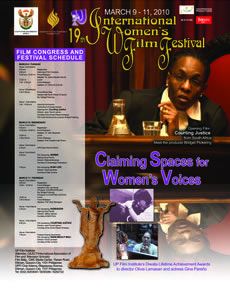“Claiming Spaces for Women’s Voices”
More than a century of film has delivered countless faces of women through images, vignettes, characters and conversations. Much have progressed since the inception of women-oriented groups and institutions in terms of transcending oppressive domains and expanding networks of empowerment; “Women and cinema” is no longer tied to the question of authorship, reception and production, but extended into (re)constructions of culture and life. The achievements of the International Women’s Film Festival (IWFF) exceeds its expected gains such as expansion of form and the exponential growth of intelligent and gender-sensitive films; it has contributed to the development of counter-ideologies that equip the woman to empower herself and others.
At this point in the history of women in cinema, we no longer look at women as a mere subject but as an active agent in film and the society at large. In this light, we come to terms with two vital areas of concern – space and voice.
We deal with the nature of space both as physical and abstract. In the physical sense, we examine the “movement” of women in the domestic sphere, spaces of industry and capitalism, the academe, the indigenous planes, politics, and cyberspace, among others. We also consider space as a personal unit, e.g. the body as a space defined by gender, culture, period and aesthetics. And in considering movement and spaces, we also examine how women are “displaced” in instances of migration, exile, retreat, and return. What are the new spaces where women are placed at present? How are women in contemporary times able to move or probably contained in old spaces? How are women dealing with or defying phallocentrism in spaces with the promise of empowerment such as the workspace and the internet? When women are placed/displaced/replaced, how is the construction of women formed, reformed and deformed?
These are just some of a handful of questions that we can only attempt to address given a concrete, solid and tangible venue of inquiry: film. We can start answering these questions and begin to uncover the intricacies of space and gender as we place cinema as a major aspect of ethnography, history, culture, women studies and the female empowerment project. Similarly, we can begin to comprehend the garbled words, mutated moans, silenced cries and unheard voices of women. We try to collect an ensemble of voices representing the different specificities of femininity through identifying spaces where the female voice is present or absent. In this light, the 19th International Women’s Film Festival is not only a selection of films, but a network of female spaces and a chorus of a multitude of female voices.


